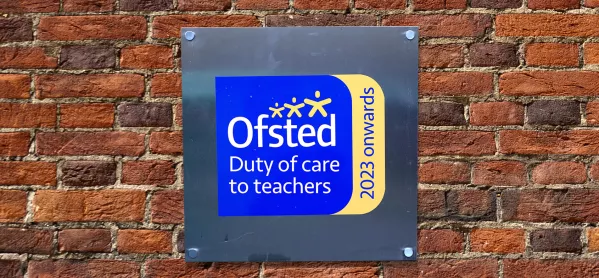Ofsted told to declare ‘duty of care to teachers’

Ofsted has been called on to publicly accept it has a duty of care to teachers in the schools it inspects following the death of headteacher Ruth Perry.
Writing in the British Medical Journal, public health expert Professor Martin McKee, who is president of the British Medical Association but was writing in a personal capacity, also says the inspectorate should “concede that it has lost the confidence of teachers and work with them to rebuild it”.
Professor McKee, of the London School of Hygiene and Tropical Medicine, wrote the article with University of Leeds professor Sarah Waters in response to the death of Ms Perry.
The article calls on the Health and Safety Executive (HSE) to investigate all cases where a suspected suicide is linked to someone’s work, and for an urgent inquiry into the welfare of teachers to be launched by the Commons Education Select Committee.
- Ruth Perry: Sister urges heads to hand in their Ofsted inspector badges
- Crisis: Heads call on Ofsted to halt inspection after the death of Ruth Perry
- Nick Gibb: Ofsted and the DfE to look at limiting judgements
Ms Perry died earlier this year, and her family have said she took her own life after a negative Ofsted inspection.
Caversham Primary School in Reading, where she was head, was waiting for a report to be published downgrading it from “outstanding” to “inadequate” when she died.
There has been a massive outpouring of grief and calls for inspection reform from the schools sector since her family have spoken out.
Ofsted ‘has safeguarding responsibilities’
Professor McKee and Professor Waters say in their article: “While the almost complete loss of confidence in Ofsted is a matter for those in the education sector to address, the health community has a duty to demand action to tackle the burden of mental ill-health associated with the way it operates.”
They calls for action from Ofsted, the HSE and the Commons Education Select Committee.
The academics say Ofsted “should publicly accept that it has a duty of care to teachers and to its inspectors, some of whom are also traumatised by the events we have described”.
They add: “We believe that it has such a duty, with failure to uphold it amounting to negligence. While Ofsted inspections place great emphasis on safeguarding by school staff, we have struggled to find evidence that Ofsted has reflected in detail on its own safeguarding responsibilities. It should also concede that it has lost the confidence of teachers and work with them to rebuild it.”
They call on the HSE to investigate every work-related suicide, in whichever sector it occurs, and ensure that work-related suicides are subject to the same requirements for reporting and prevention as other occupational deaths.
The article says: “In France, for example, if there is even a suggestion of a link between suicide and working conditions, the burden of proof falls on the employer to show otherwise.
“In the UK we do not even know with certainty how many teachers have killed themselves in circumstances linked to Ofsted inspections, but we are aware of at least eight others.”
And the academics call on the Commons committee to conduct an urgent inquiry into Ofsted’s impact on the welfare of teaching staff.
Paul Whiteman, general secretary of the NAHT school leaders’ union, said: “We welcome this powerful intervention and the calls for the Health and Safety Executive (HSE) to investigate all suicides linked to work, including in schools, and to launch an inquiry into work-related stress in education.
“The outpouring of grief and anger across the profession following the tragic death of Ruth Perry has been accompanied by upsetting evidence of other school leaders who have been left in very dark places due to Ofsted inspections.”
He added: “As well as the suggested involvement of the HSE, we need the government and Ofsted to accept what they are hearing loud and clear from school staff, and work with the profession to agree and deliver root and branch reform to inspection.”
An Ofsted spokesperson said: ”Our inspectors are all former or current school leaders themselves, so they understand how it feels to be inspected. We inspect first and foremost in the interests of children, but we aim for all our inspections to be carried out professionally and sensitively, with careful regard to their impact on school staff.”
You need a Tes subscription to read this article
Subscribe now to read this article and get other subscriber-only content:
- Unlimited access to all Tes magazine content
- Exclusive subscriber-only stories
- Award-winning email newsletters
Already a subscriber? Log in
You need a subscription to read this article
Subscribe now to read this article and get other subscriber-only content, including:
- Unlimited access to all Tes magazine content
- Exclusive subscriber-only stories
- Award-winning email newsletters
topics in this article



